Tatjana Gürbaca returns to Opera Vlaanderen with her Parsifal production from 2013. Last year, director Tatjana Gürbaca was involved in a very special Ring des Nibelungen for Theater An Der Wien. A production in which the four operas of Wagner's Ring were reduced to three: a trilogy without a Vorabend. Gürbaca is a theatre-maker who has some courage, she has no problems rearranging the source material if necessary, provided that this produces good theatre. This season Opera Flanders has resumed her Parsifal production from the Wagner year 2013. Awarded (voted the best opera production of 2013 by Opernwelt) and controversial - it all sounds very much as a recommendation. In Parsifal, Gürbaca does not go as far as in the rebuilt Ring in Vienna but her staging of the story of the Grail may ask something of the mental flexibility of many Wagner lovers. For those who are attached to tradition too much, the all too rectangular minded Wagnerians who wish, for example, not to applaud for reasons of piety after the first act, this production is probably not spent. Whereas Richard Wagner derived his basic ideas for Parsifal mainly from Schopenhauer, Tatjana Gürbaca quotes Friedrich Nietzsche as an important inspiration for her take on Parsifal: in relation to the grail community that realizes that God is dead and in comparing Klingsor with Zarathustra (a thinker who disengages himself from the world). They have been friends for a while but Nietzsche was not of influence on Wagner here. It was only after his break with the Sorcerer of Bayreuth that Nietzsche wrote the books with which he would acquire himself a place in the Patheon of Important Thinkers. After breaking with Wagner, Nietzsche rejected Schopenhauer as well (a philosophy of anti-life). He turned Schopenhauer upside down with Dionysian drift, and became the man who would become known as the Philosopher with the Hammer. You have to understand something well in order to be able to turn it upside down. Nietzsche did it with the philosophy of Schopenhauer and you could say that Tatjana Gürbaca does it with Wagner's Parsifal. With a hammer, Gürbaca crushes the sacred elements that house in this Bühneweihfestspiel and pulls the male-female relationship (the relationship between Kundry and Amfortas) away from the realm of sin. (With the aforementioned in mind you could say that Gürbaca pushes "her" Parsifal from Schopenhauer to Nietzsche. From proto-Budhist to proto-Dionysian.) Together with set designer Henrik Ahr, Gürbaca, who has already received prizes for best and most promising director, is turning Parsifal into an sobering and, to a certain extent, even disillusioning theatre event. It's disillusioning only to some extent, because also in this sparse, extremely austere staging of Parsifal, the music - one of the most beautiful in all of Western music - regularly lifts the mind to lofty regions. Conductor Cornelius Meister was already an assistant to Pierre Boulez in Bayreuth (the Schlingensief-Parsifal, as dark as the stage was in that production, so light is it is here) and he has taken the tempi preferences from the French maestro with him. In a relatively quick reading he leads the Symphony Orchestra Opera Vlaanderen convincingly through Wagner's last opera (the at times all too robust brass - overture! – is in this respect no reason to be petty). One could say that Gürbaca pushes Parsifal from Schopenhauer to Nietzsche. From proto-Budhist to proto-Dionysian. In this production it becomes clear once again why Wagner's original idea of the Gesamtkunstwerk, a theatre play in which all ingredients are equal to each other, did not stick (after Das Rheingold, Wagner would more and more abandon it). You can get rid of a lot of scenery, the visual power of the music does its work anyway. Gürbaca and Ahr seem to be well aware of this. For the full four hours the story passes us by on an (almost) empty stage and under bright lights. As a matter of course, the emphasis is placed on the characters and their underlying relationships. Away from the sacred and wary from all spiritual intentions, Gürbaca's Parsifal tells a story about people of flesh and blood (a lot of blood). This might not be a Parsifal to start with, because the original story (despite the bright illumination - wink) is often too invisible for that. The prelude is used to introduce the main characters (except Parsifal). Amfortas kisses with Kundry and is blamed for that. By Kundry, who reacts in humiliation, and by the rest of the cast, who look like office workers on (a very) Casual Friday. With the kissing of Kundry, giving in to carnal lust, Amfortas not only injures himself but the whole community of which he is a member. It is something the community of Grail Knights will violently remember Amfortas of that. Gurnemanz is a powerful and well controlled role of the Slovak bass Stefan Kocan - whose appearance is reminiscent of René Pape in his early years. During the prelude, he is the first to appear on stage only to take his place in a wheelchair once his singing role starts. Gurnemanz leaves the wheelchair during the Transformation Scene to join the procession of grail knights and then finish the first act on foot. This Transformation Scene contains one of the better ideas of the evening by letting the voice of Titurel - a role off-stage sung by Markus Suihkonen, who also takes on the role of second grail knight - come out of the throats of all grail knights. It gives Titurel's voice something extra pregnant, as if it has penetrated into the flesh of the living world from the beyond. In the third act, Gurnemanz is back in the wheelchair. What that exactly means remains a mystery. You might start to think that not everything you see on stage has to be taken literally. What is happening on stage should perhaps also be seen as a state of mind, and not just as concrete representation. (That Gurnemanz's paralyzed legs, for example, depicts his mental rather than his physical condition is only a thought in an empty room.) The grail knights bring in children who are washed and measured. A balloting, a preparation to take over the role of the adults in the course of time? New recruitment. Still innocent of the sin that stains the life of the adult human being. The shooting of the swan by Parsifal happens by throwing a bucket of blood over a child. It is a crime. A murder, committed in the present, of the future. It is fair to say that this Parsifal is not too clever. Erin Caves sings and plays the title role, averse to heroism, but convincingly and strongly. With his singing Caves makes an impression and in his acting he does justice to the label Der Reine Tor. With his sharp, pronounced voice he reminded me at times of Jon Vickers. (Whether the late Vickers, who was known as a very religious Christian, would step into such an ugly, unearthed staging, wary of religion, can sincerely be doubted). The Parsifal of Caves gets in the Kundry of Tanja Ariane Baumgartner a very strong partner / opponent. It is, after her Fricka in Das Rheingold and Die Walküre from last year's Castorf Ring in Bayreuth, very pleasant to see and hear Baumgartner again. In the third act, the role of Kundry normally consists of uttering a shriek and singing exactly one word: "Dienen" (“to serve”). When Kundry has done so here, she puts her money where her mouth is and puts herself behind the wheelchair of Gurnemanz. In contrast to the anonymity in which Kundry usually disappears, Gürbaca has given her a major acting role in the third act. In this production it is clear from everything that the kiss between her and Amfortas, and between her and Parsifal, should not be seen as a violation of decency but as a possible prelude to a "normal" relationship between men and women. This is not a demonic Kundry, a helpless victim in the clutches of master manipulator Klingsor. In her relationship with the most important men of the opera, Parsifal, Amfortas and Klingsor, she seeks (and finds) a certain basis of equality. In the end, Kundry makes a futile attempt to bring together the worlds of the grail community and Klingsor. For this she cuts her wrists twice, the second time at the end of the third act, after which she dies. It is Gurnemanz who then, crawling out of his wheelchair, tries to put together the hands of Kundry and Amfortas. To no avail. As to make clear that Kundry's attempts to bring the two worlds together have failed. Perhaps it would have been better if the opera had not been called Parsifal here, but Kundry. Because the scenery during the course of the opera doesn't change, not even when we move to the world of Klingsor in the second act, our attention stays entirely with the personages. This zooming in on characters results in a Personenregie that convinces and alienates. (For example, what's the business with Gurnemanz in that wheelchair?) Gürbaca's Parsifal pays special attention to the role of women, except for Kundry also for the flower maidens in the second act. The flower maidens (flower women here actually) get extra depth by depicting them as a community of women of all ages: young and old. The presence of older women highlights the fate of the flower maidens: waiting in vain for years for the man who comes to save them from their fate. These are women who actually want to escape their hate/love relationship with Klingsor but don't see any alternative, they can't go anywhere else. It is tempting, with the emphasis for the position of women in mind and the current discussion about equality between the sexes back from never been away, to call this a feminist Parsifal. Perhaps it would have been better, considering her being a prime mover of things, to call the opera Kundry instead of Parsifal. One of the unsung virtues of an absent (empty) stage is that the singers cannot hide behind beautiful scenery. That leads here at least to the fact that the scene in which the flower maidens seduce Parsifal does not get bogged down in a sexless (and humorless) choreography. As if struck by lightning, it becomes clear to Parsifal that it was Kundry who, after kissing him on the mouth, was the cause of Amfortas' unstoppable wound. With Klingsor - Kay Stiefeman, who gives the role, despite lacking a castle and magic mirror, a lot of presence - Parsifal has unfinished business and he kills, after reclaiming the holy spear, the wizard. This all to the horror of Kundry who will still blame him for that in the third act, 20 years later. In the third act, circumstances are rapidly deteriorating for Amfortas. He is blamed for the misery, the spiritual emptiness in which the community of grail knights finds itself, and mockery turns into abuse. The grail knights put glass in his shoes and hang a sign "Mörder" around his neck. The moment Parsifal grants him with the holy spear a merciful death comes not a second too soon for him. With Christopher Pohl's Amfortas we have a weaker link in the cast. Pohl sounds powerless rather than tormented, perhaps he had a lesser day. A good staging is much more than a beautiful picture and Gürbaca takes that knowledge to the edge. The total absence of any spherical images not only emphasises the previously mentioned Regie of personages, the naked stage, far removed from anything spiritual or religious (no crosses here), makes us realise, probably unintentionally, how religious the libretto, full of the urge for redemption and pregnant with Christian symbolism, can be interpreted. Whatever Wagner's original intentions were, whether it was religion or art-substitute-religion he was after, the discussion as to whether Parsifal is a Christian opera (Laufenberg's current Bayreuth production comes to mind) or an opera with only Christian symbolism is completely irrelevant to Gürbaca. It was the need to escape the everyday grimness that led Wagner to conceive Parsifal. With Spartan resources Gürbaca is pushing us back into that grim world. Where Wagner gives his Parsifal a relatively good ending (Amfortas is freed from his suffering, Kundry, that wicked woman, dies and the grail community gets a new start), Gürbaca grants the opera, and its audience, a grimmer one. What the faith will be of Parsifal and the grail knights - who have showed themselves borderline fanatics in the course of the third act - can be guessed at. The devotion, bordering on madness, with which the knights hoists Parsifal in the old, disproportional large armour of Titurel does not promise much good. For salvation, only the music remains. The music, improbable in beauty, that opens up a world in which you can live and of which it is difficult to say farewell once the performance is over. It is the music that warms the heart and illuminates the head when I walk back to the hotel, past the construction site next to the opera house, an environment that feels like an epilogue to Gürbaca's staging of Parsifal. Opera Vlaanderen 24 March 2018: Dates 18 March t/m 4 April 2018 Conductor: Cornelius Meister Orchestra: Symfonisch Orkest Opera Vlaanderen Chorus: Koor Opera Vlaanderen Childrens' Choir: Kinderkoor Opera Vlaanderen Director: Tatjana Gürbaca Stage design: Henrik Ahr Lights: Stefan Bolliger Parsifal: Erin Caves Kundry: Tanja Ariane Baumgartner Gurnemanz: Stefan Kocan Amfortas: Christoph Pohl Klingsor: Kay Stiefermann Titurel: Markus Suihkonen - Wouter de Moor
1 Comment
|
TIMELINE
July 2024
|

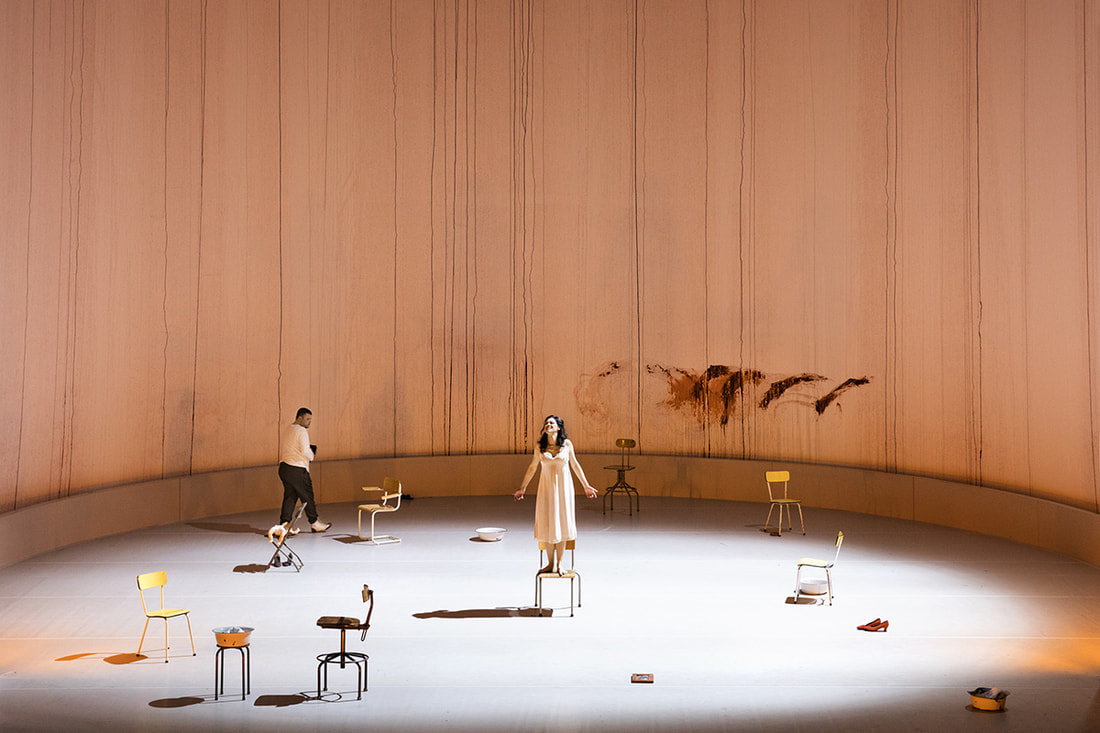
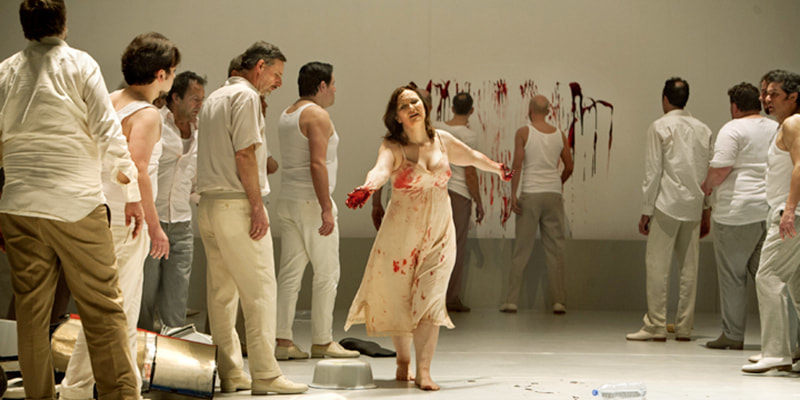
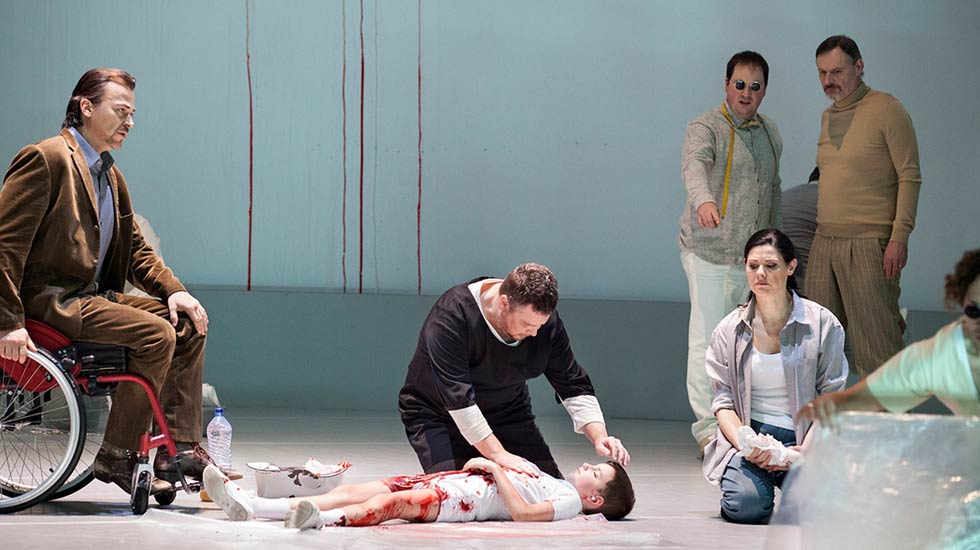
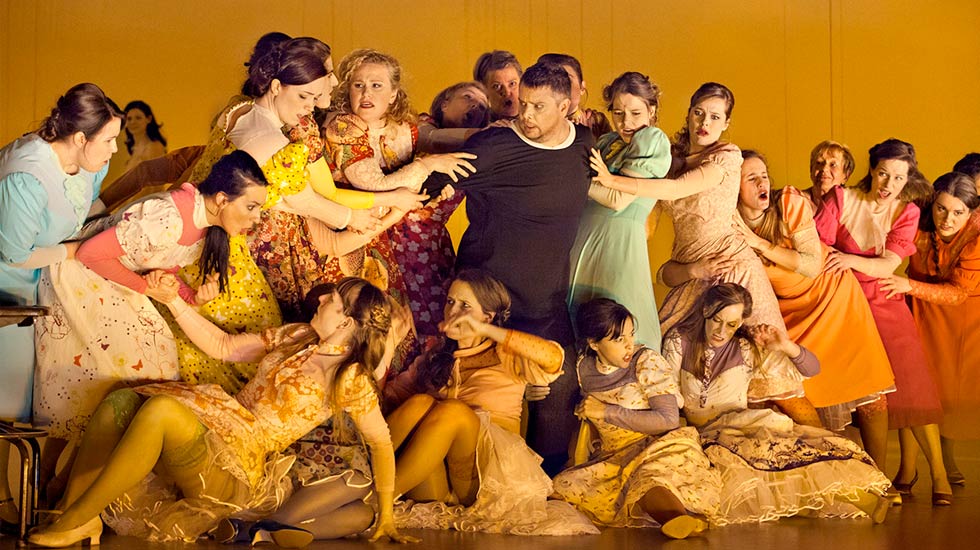
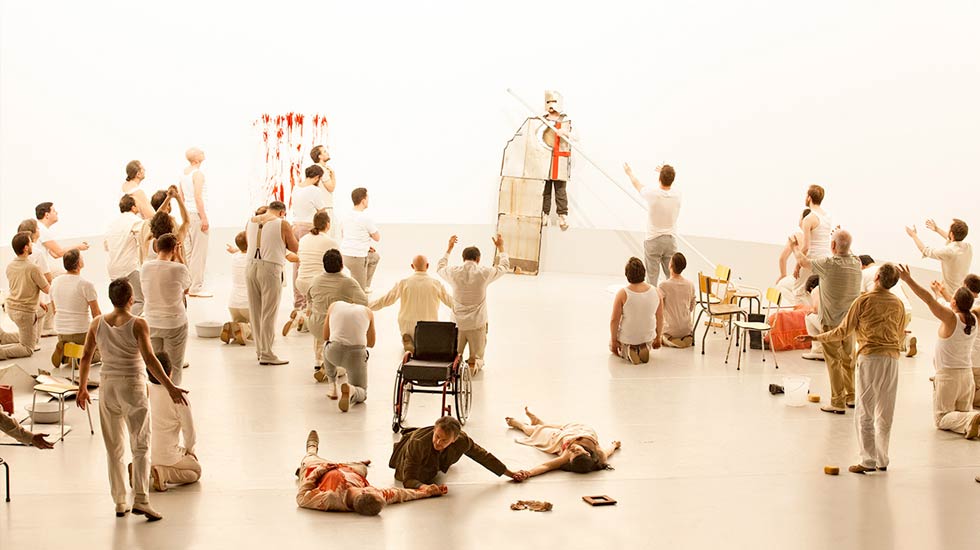
 RSS Feed
RSS Feed